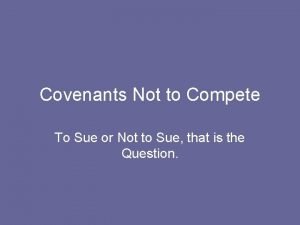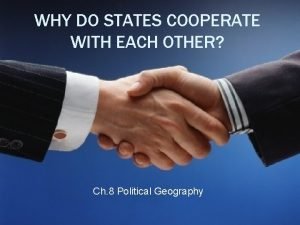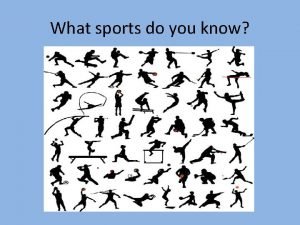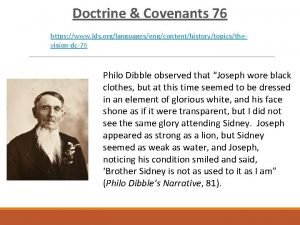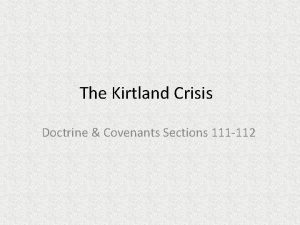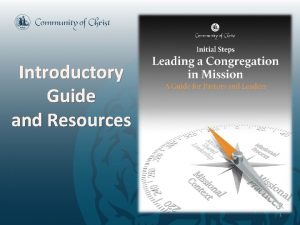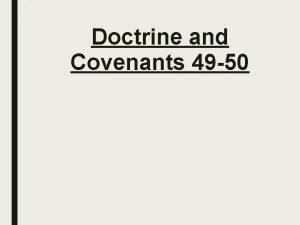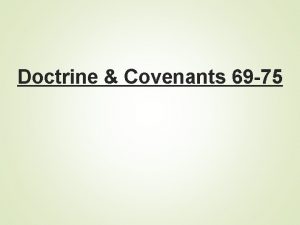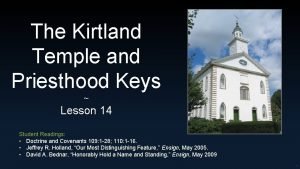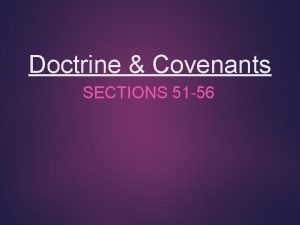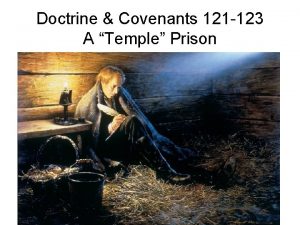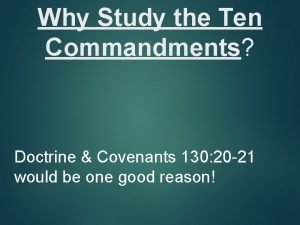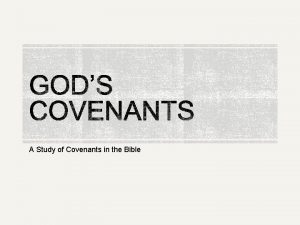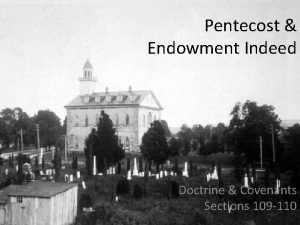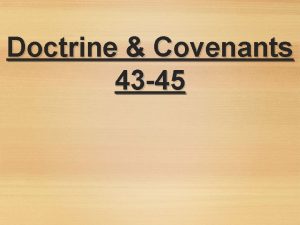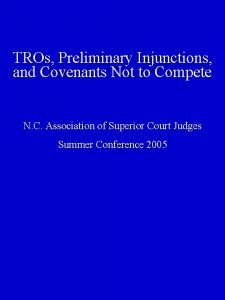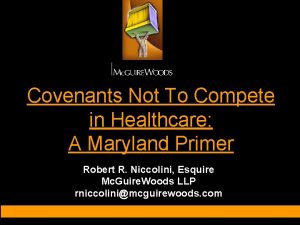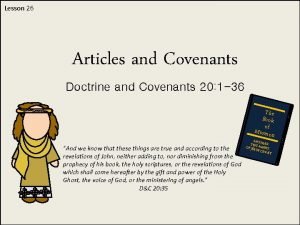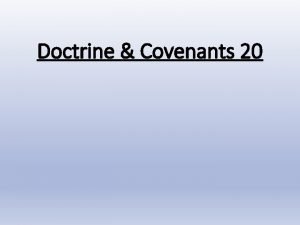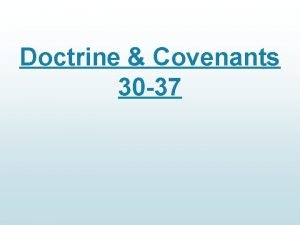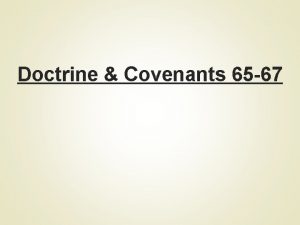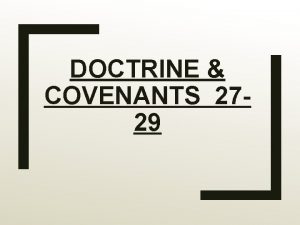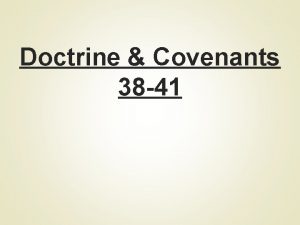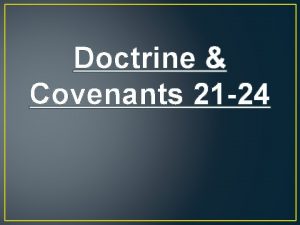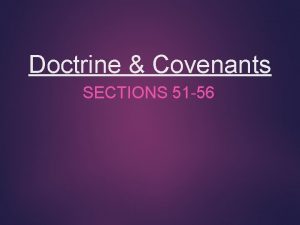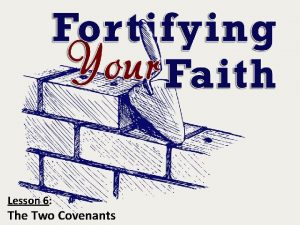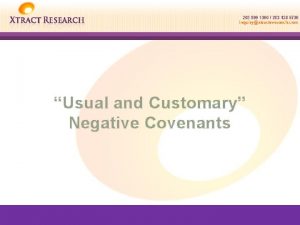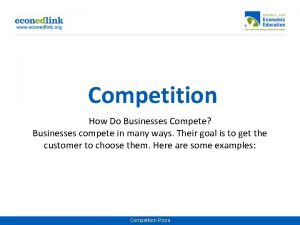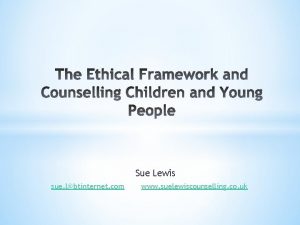Covenants Not to Compete To Sue or Not




































- Slides: 36

Covenants Not to Compete To Sue or Not to Sue, that is the Question.

A NATIONAL LOOK AT INSURANCE AGENT AND BROKER UNDERSTANDING AND USE OF COVENANTSNOT-TO-COMPETE AND TRADE SECRET AGREEMENTS.

What are Non-Compete Agreements? • A non-compete agreement is a written agreement between an employer and an employee that, during the employment period and for some “reasonable” period thereafter, normally ranging from 6 months to 5 years, the employee will refrain from competing with the employer for business.

Non-Competes Can Include • -Can be a geographic restriction “you will not compete within a 25 mile radius” -Can be a customer restriction “you will not solicit or make sales contact with any customer of the employer with which you had direct or indirect contact during employment”

• It might contain a “buy out” provision In this case the employee agrees to pay reasonable liquidated damages of $250, 000 or some other agreed-upon amount.

Who Might Use Non-Competes? • Insurance Agencies with Producers • Insurance Brokerages with Brokers • Insurance Companies with their Agents

What is at Stake? – Expiration Lists and the proprietary information related to each policy sold are the valuable assets of an agency vs – The producer’s ability to make a living by making and keeping contacts with customers

Public Policy Issues • The rights of employers to protect the intangible property of the employer, often referred to as the “goodwill” between the employer and a customer • Opposing this is the public policy that promotes free trade and abhors the notion that a former employee should be limited in his or her right to make a living in their specialized area of expertise or training

Are Covenants-not-to-Compete Enforceable? • Yes and No • Depends on the State you are in • Depends on the Agreement and how it was written. • Depends on when the Agreement was put into effect

An Enforceable Contract • A valid and enforceable covenant-not-tocompete must be: – 1. In writing – 2. Part of a contract of employment – 3. Based on reasonable consideration – 4. Reasonable in duration and geographical limitation – 5. Not against public policy

• As a general practice restraints on trade and limitations on the right of an employee to change jobs are frowned on by the courts and they will do everything they can to find them unenforceable.

Non-Piracy or Trade Secrets - Tort of unfair competition - Uniform Trade Secrets Act (UTSA) • Passed some version in 40 states Including California • Can include broad injunctive relief – Misappropriation of trade secrets – Threatened misappropriation “inevitable disclosure”

Drawbacks to Enforcing Trade Secret Infringement – In reality, courts are reluctant to issue immediate injunctive relief, so litigation may be necessary – Plaintiffs bear the burden of proof – Clients are frequently the main source for the facts in dispute – The amount of commission lost is usually small in relation to cost of suit

CPCU Research Project • Methodology – Included an on-line questionnaire about attitudes and awareness of local laws governing the use of Non-competes – Secondary research consisted of research into the current status of CNTC and Trade Secret Agreements nationally

Primary Research Findings • CNTC are more frequently used by agents and brokers than are Trade Secret Agreements • Reported suits within the past five years are few and are lost or abandoned about as often as they are won • Agencies that were sued for breaking a CNTC lost as often as they won.

Use of Agreements

Enforceable in State

Relative Importance of Covenants. Not-to-Compete • Relative importance indexed at 75. 2 out of possible 100 • Importance increases as size of the agency increases • In agencies with 5 or fewer producers, the index was 70. 4 indicating a strong interest even for smaller agencies.

Relative Importance to Agencies Number of Producers in the Agency Interest in Covenants (Index) Fewer than 5 70. 4 From 5 to 15 79. 6 From 15 to 25 81. 4 More than 25 90. 6

California Results • True state of these covenants is unclear among agents • About one-half of the respondents appear to use CNTC • Nearly four out of five agents in California believe CNTC are enforceable • In general Trade Secret Agreements are thought to be enforceable

Reluctance to Use Agreements • Some don’t choose to take action against employees • Some consider these agreements to be unenforceable • Some feel it is too expensive to enforce these agreements

The Real Facts (at least in California) • Covenants-not-to-compete are invalid in California • BUT • California law does allow non-competes as part of the sale of a business • There are other circumstances where Non. Competes are enforceable:

• 1. The sale of goodwill • 2. The sale of corporate shares. • 3. The sale of a company’s operating assets. • 4. The dissolution of a partnership. • 5. The sale of an interest in or dissolution of a limited liability company.

California Courts • Even in the sale of a business, CNTC are interpreted narrowly • Courts require reasonable time limits and specifically defined business and geographic areas • Tend to allow confidentiality and nondisclosure agreements to protect proprietary information (client lists, e. g. )

Research Project Conclusions • There is significant confusion over the enforceability of non-competes • Insurance Associations could play a more significant role in sorting out the laws of their state for their members • Organizations cannot overlook the human component and should develop clearer policies within the agency • Finally, we felt the research pointed to a need for educating employees as to proper conduct and what is proprietary.

Ten Tips for Protecting Your Assets • 1. Don’t ask employees to sign posttermination “non-compete” agreements. Instead, ask them to sign non-solicitation, non-disclosure and confidentiality agreements. • 2. Make very clear the consideration given to the employee in exchange for signing the agreement.

• 3. State the importance of the protective covenants to the agency. • 4. Make sure the employee acknowledges that the agreement isn’t unreasonably restrictive and doesn’t prevent the employee from earning a living. • 5. Be sure that the agreement is assignable in case you sell your agency assets

• 6. Include a “blue pencil” clause which states that if one provision is struck down, the rest of the contract is still enforceable • 7. The agreement should expressly indicate that injunctive relief may be sought in addition to monetary damages

• 8. The agreement should clearly state that the agency owns all customer accounts, expirations lists, files, trade secrets and the employee has no vested interest in the accounts or commissions outside of any agreements made or negotiated in advance of employment.

9. There should be some limitation expressed indicating that the employee should not compete while employed. 10. Be sure to state that this agreement in no way nullifies the “at will” nature of the employment.

Conclusions • We can’t lose sight of the fact that there always two sides to these covenants and there is an aspect of fairness that should govern how they are written, used and enforced.

• Canon 1. CPCU’s should endeavor at all times to place the public interest above their own. • Canon 2. CPCU’s should seek continually to maintain and improve their professional knowledge, skills and competence. • Canon 3. CPCU’s should obey all laws and regulations and should avoid any conduct or activity which would cause unjust harm to others

• Canon 4. CPCU’s should be diligent in the performance of their occupational duties and should continually strive to imporve the functioning of the insurance mechanism. • Canon 5. CPCU’s should assist in maintaining and raising professional standards in the insurance business.

• Canon 6. CPCU’s should strive to establish and maintain dignified and honorable relationships with those whom they serve, with fellow insurance practitioners and with members of other professions. • Canon 7. CPCU’s should assist in improving the public understanding of insurance and risk management.

• Canon 8. CPCU’s should honor the integrity and respect the limitations placed upon the use of the CPCU designation. • Canon 9. CPCU’s should assist in maintaining the integrity of the Code of Professional Ethics.

As a Chartered Property Casualty Underwriter: • I shall strive at all times to live by the highest standards of professional conduct; • I shall strive to ascertain and understand the needs of others and place their interests above my own; and shall strive to maintain and uphold a standard of honor and integrity that will reflect credit on my profession and on the CPCU designation.
 I will not compete
I will not compete Compete concrete noun
Compete concrete noun Why do organisms compete
Why do organisms compete Why do states cooperate and compete with each other
Why do states cooperate and compete with each other Dare to compete
Dare to compete Kejiban tegese
Kejiban tegese It is a sport in which participants compete as individuals
It is a sport in which participants compete as individuals Small producers compete or perish
Small producers compete or perish Lds doctrine and covenants
Lds doctrine and covenants Wwwlds
Wwwlds Doctrine and covenants section 111
Doctrine and covenants section 111 D&c section 121
D&c section 121 Doctrine and covenants 21
Doctrine and covenants 21 Doctrine and covenants 163
Doctrine and covenants 163 Doctrine and covenants learning assessment
Doctrine and covenants learning assessment Prophet + priest + king chart
Prophet + priest + king chart Doctrine and covenants 38
Doctrine and covenants 38 Doctrine covenants 50
Doctrine covenants 50 Doctrine and covenants 69
Doctrine and covenants 69 Priesthood keys the restoration of priesthood keys
Priesthood keys the restoration of priesthood keys Doctrine and covenants
Doctrine and covenants Doctrine and covenants 121-123
Doctrine and covenants 121-123 2 most important commandments
2 most important commandments 7 covenants of the bible
7 covenants of the bible Doctrine and covenants 20
Doctrine and covenants 20 Doctrine and covenants section 110
Doctrine and covenants section 110 Doctrine and covenants
Doctrine and covenants Vocabulary workshop level d unit 1
Vocabulary workshop level d unit 1 Sue sentance
Sue sentance Gavitazione
Gavitazione Sue fidler
Sue fidler The text presents
The text presents Sue cowley behaviour management
Sue cowley behaviour management Sue fidler
Sue fidler Sue claridge
Sue claridge Sue jennings epr
Sue jennings epr Lengua de sue
Lengua de sue
